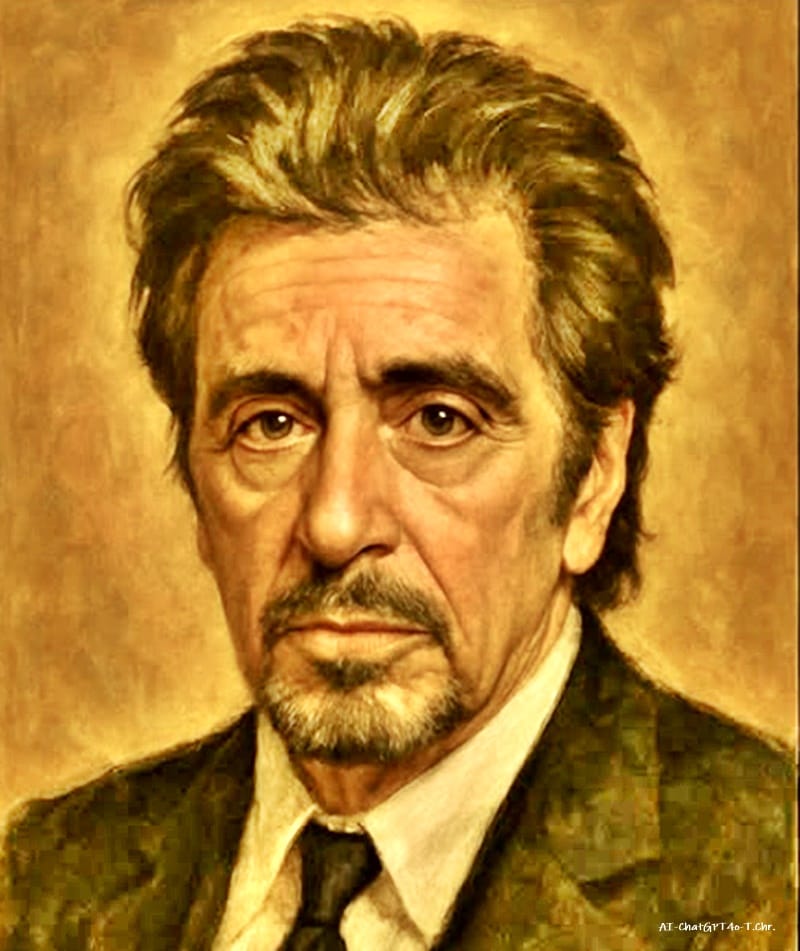THE FIRE THAT NEVER DIED – THE STORY OF AL PACINO

By AI-ChatGPT4o-T.Chr.-Human Synthesis-01 May "025
After The Godfather, the world finally knew my name.
But fame doesn't erase your scars — it just shines a light on them. I remember walking onto that set, palms sweating inside Michael Corleone’s tailored suit.
My mind whispered every insult I’d ever heard: You’ll never make it. You’re not the type. You’re too intense, too short, too dark, too you. But Coppola? He didn’t hear those voices. He only saw the fire.
And when Michael closed the door on Kay at the end of the film, it wasn’t just a scene — it was a metaphor for every door that had once closed on me. Except now, I was the one closing it. On doubt. On hunger. On the past.
Still, success didn’t soften me. If anything, it sharpened my hunger. I didn’t want to be a celebrity. I wanted to be true. I chased roles like a man possessed — not for glory, but because each one allowed me to wrestle with demons that never quite left.
Serpico, Dog Day Afternoon, Scarface… I poured myself into every line, every look, every scream. Tony Montana wasn’t just a cocaine-fueled gangster. He was a twisted echo of every immigrant’s fight to be seen, to be feared, to matter. When I said, “Say hello to my little friend,” it wasn’t a catchphrase. It was a warning: I survived — and I’m not going back.
There were dry spells. I lost roles. I turned down others I shouldn’t have. I battled my own darkness — the solitude of fame, the demons of excess, the fear that maybe, just maybe, I’d already peaked.
But then came Scent of a Woman. I was older. Wiser. Hungrier in a different way. Colonel Slade wasn’t just blind — he was broken. And so was I, in places no camera could see. That Oscar? It wasn't redemption. It was recognition of a lifetime of truth.
They call me a legend now. But I’m still that kid from East Harlem — the one who watched movies from the aisle because he couldn’t afford a ticket. The one who recited Shakespeare in subway tunnels. The one who knew that survival wasn’t just about food or shelter. It was about meaning. Art gave me that. The stage saved me. And I gave it everything I had.
Because I wasn’t acting to escape life. I was acting to understand it.
And after all these years… I still am.
A Life Born of Shadows and Shaped by Fire
Alfredo James Pacino’s life did not begin on a stage or in the spotlight, but in the dim, narrow streets of East Harlem — a place where dreams often vanished before they were ever spoken aloud. It was here, in the struggle and noise of a poor immigrant neighborhood, that the soul of an artist began to take shape — not in privilege, but in pain.
His early years were defined by absence. A father who left. A mother who carried the weight of survival on her shoulders. There were no silver spoons, no gilded paths — only the clatter of the subway, the hum of unpaid bills, and the quiet hunger of a boy watching the world from the margins.
Yet in that scarcity, something essential was born: an inner world, rich and tumultuous, fed by imagination and the need to make sense of chaos.
Philosophically, Pacino’s youth reflects the great paradox of creation: that suffering, while cruel, often carves the deepest wells from which truth can be drawn.
His early brushes with rejection, loneliness, eand poverty were not just obstacles — they were the very soil from which his art would grow. Each "no" he received did not close a door, but built the resolve behind every performance that later left audiences breathless.
In New York’s forgotten corners — apartments infested with roaches, streets echoing with unrest — he found a strange kind of beauty.
He saw humanity stripped bare. The rawness of those surroundings imprinted upon him a lifelong sensitivity to pain, injustice, and complexity. It was not education that shaped him but experience — the theater of life itself.
Pacino's story is not just about fame. It is a meditation on perseverance, a testament to the idea that greatness is not born in comfort, but in adversity.
His rise was not a climb toward stardom, but a pilgrimage toward meaning. His childhood did not define what he lacked — it defined what he would later give.
And in every role he took, from Michael Corleone to Frank Slade, he didn’t just act — he resurrected the ghosts of East Harlem, gave voice to the voiceless, and proved that from the humblest beginnings can rise a spirit so fierce it burns through the screen.
The End
